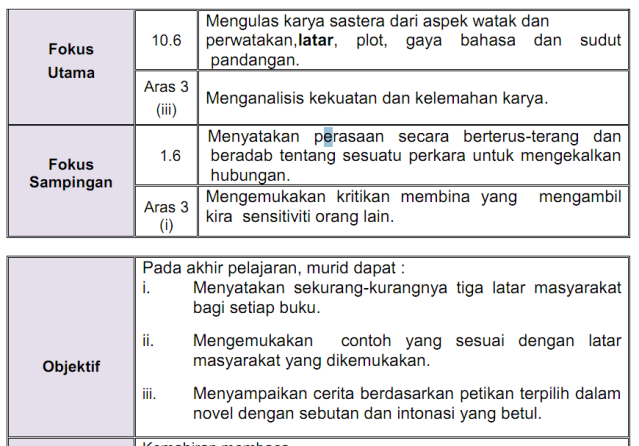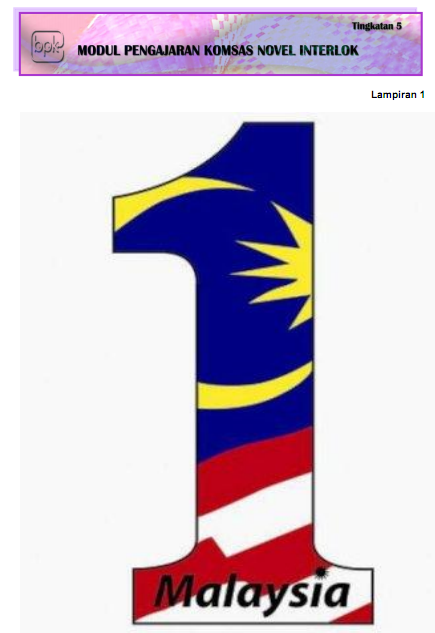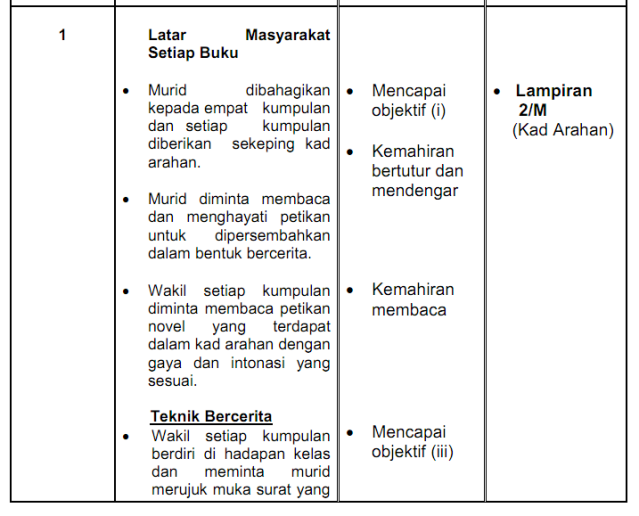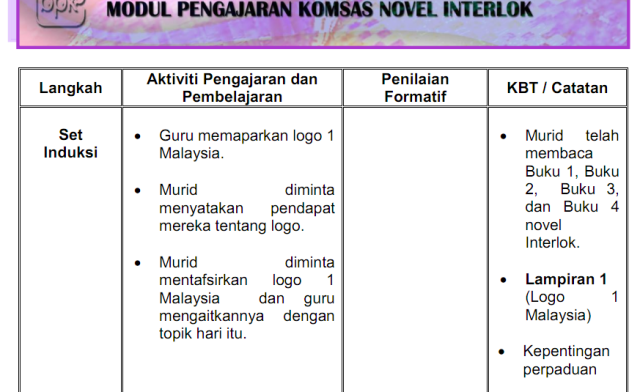
by Eyes Wide Open
Literature is indeed an excellent subject to help students develop communication skills, creative expression, critical thinking skills and appreciation of culture. Most of all, teaching literature should be about teaching the student to enjoy reading for himself/herself, so that through books he/she can gain an knowledge about things in the world-at-large.
Interlok was selected as the text for the compulsory literature component of the SPM Bahasa Melayu paper. However, it seems that Interlok has now been elevated to the status of race relations handbook. This can be seen in the various statements made by the literati, think tanks and the author himself.
Our own Education Ministry study guide seems to hint that this is exactly the ‘mission’ that has been assigned to Interlok, given its potential to mind-bend the way youths view their own race and their assigned place in the societal hierarchy.
It is clear that there is a quiet, unwritten acceptance that Interlok is an accurate roadmap for Malaysian race relations that must be taught to SPM students.
Missing The Forest For The Trees
Many people have argued that people should not be so sensitive, and that they should give Interlok as chance, that opinions that Interlok is being used as a political/racial indoctrination tool is just pure fantasy. We say, these people have not appreciated the scope of the issue at hand – this is a NATIONAL issue that affects every SPM student and their families.
But rather than present another lengthy argument against the use of Interlok in schools, we’ll let the cold, hard facts speak for themselves.
Hopefully, the facts and documentary evidence we present today will put all other arguments and conjectures to rest once and for all.
HartalMSM has managed to obtain a copy of a classroom lesson plan, designed and prescribed by the Education Ministry’s Bahagian Pembangunan Kurikulum – BPK (Curriculum Development Section). We present excerpts of it here. See for yourself whether it is really the government’s intention to indoctrinate students via the study of Interlok.
Below are excerpts of a classroom lesson plan for Interlok:
Translated:
Objectives
At the end of the lesson, the student can :
i. State at least three social settings for each book.
ii. Provide appropriate examples for the social settings presented.
iii. Present the selected excerpts of the novel with correct pronunciation and intonation.
So the Ministry’s intended result is for students to memorise the “social settings” of each race as exemplified in the selected excerpts. At this point, it may begin to smell suspicious to those who are quicker on the uptake. But anyone still entertaining optimistic thoughts that Interlok is really meant to teach students literature should quickly abandon all hope. The political indoctrination agenda becomes quickly apparent as the lesson plan progresses.
Blatant Political Indoctrination In Classrooms
Translated:
STEP: Induction Set
Teaching and learning activity
- Teacher to display 1 Malaysia logo.
- Students to be asked to state their opinions of the logo.
- Students to be asked to interpret the 1 Malaysia logo and teacher to connect it to the day’s lesson
Isn’t the point of a language lesson to teach language? Why are students in a classroom being asked to study a political slogan. What does it have to do with literature? Since when did language / literature textbooks become political education tools?
It is patently obvious that the real intention of the lesson plan is anything BUT literature! In reality, it looks like it has been designed to drill the officially-sanctioned mode of race relations into students, just like what the next section reveals:
Translated:
STEP 1 – Social Setting of Each Book
Teaching and learning activity
– Students to be divided into four groups and each group is given an card with instruction.
– Students asked to read and and appreciate the given excerpts, to be presented again in storytelling format.
– A representative from each group to read excerpts from the novel found in the instruction cards with appropriate style and intonation to demonstrate the social setting found in the excerpts of the novel.
And just what are students expected to “read and appreciate”? Here are a sampling of the various excerpts that students have to discuss for the classroom activities above:
Depicting Malay society
Excerpts from Buku 1 to be read by students in class:
- Ibu Seman mundur sedikit member jalan kepada dukun ituu. Kemudian dia membawanya ke dekat suaminya yang sedang terbaring seperti mayat. (Topic: Pak Musa is terminally ill, but being an ignorant villager, visits a shaman instead of a hospital)
- “Ada. Kopiah merah juga akan kubelikan,” jawabnya dengan senyum melebar. (Topic: Despite his poor health, Pak Musa is in good spirits, naively thinking his family would be well taken care of with the money he got from Cing Huat)
- Berita kematian Pak Musa itu dalam sekejap masa saja berkocak mengganggu ketenangan waktu subuh. (Topic: Pak Musa suddenly dies, setting the stage for Cing Huat to appear later to seize all his properties and evict his family like mangy dogs.)
Depicting Chinese society
- “Ah, tak usah lu khuatir. Dia sudah bagus kerja sini, itu tauke bilang Cing Huat banyak rajin; dan kalau lu mahu jual dia mahu beli.” Paman Kok Leng tersenyum lebar. (Topic: Child slave trade / parents selling children is common practise among the Chinese.)
- Untuk mencari wang mereka berlumba-lumba supaya boleh dapat lebih banyak, tetapi untuk mengeluarkan wang seperti berderma mereka berusaha supaya dapat memberikan seberapa yang sedikit. (Topic: The typical Chinese are aggressive economic predators, with little social concerns)
Depicting Indian society
- Adakah ini fitnah? Adakah orang ini sengaja mahu memburuk-burukkan Maniam? (Topic: Indians are big gossips and slanderers.)
- Masyarakat kebun itu gempar. Beberapa orang kuli lelaki ikut Perumal mengejar Maniam. Tetapi Maniam tidak peduli, dia sudah mabuk seperti babi gila. (Topic: Indians are irrational and violent people)
- Anak-anak kita mesti diajar bahasa dan kebudayaan kita. Mereka mesti kita beritau tentang negeri dan bangsa kita. (Topic: Tamil vernacular schools exist to teach Indian children to love Indian culture, not because there was no other education option for them.)
How Fun Is This So Far?
I can hear some people still stubbornly shaking their heads and insisting that everything being said here is wild, unsubstantiated conjecture. Well, here’s a screenshot that shows the teacher’s copy of the worksheet for the Indian Social Setting excerpt that students must answer in the classroom:

Screenshot of actual sample worksheet prepared by Education Ministry to be used in the classroom. Notice the kind of racial stereotypes being force-fed into students' minds?
Here’s another screenshot of another worksheet that students have to do, complete with sample answers for the teacher. Notice the development of a palpable narrative as the excerpts progress down the worksheet: the Malays are devout people > the Chinese are bigoted against the innocent, devout Malays > yet the Malays still save the Chinese’s lives (despite the fact that they were swindled out of all they owned by the Chinese). And notice the use of the word “masyarakat” (society) and not “individu” or “watak” (individual or character). The characteristics of a single character in the novel is being imprinted upon the entire societies.
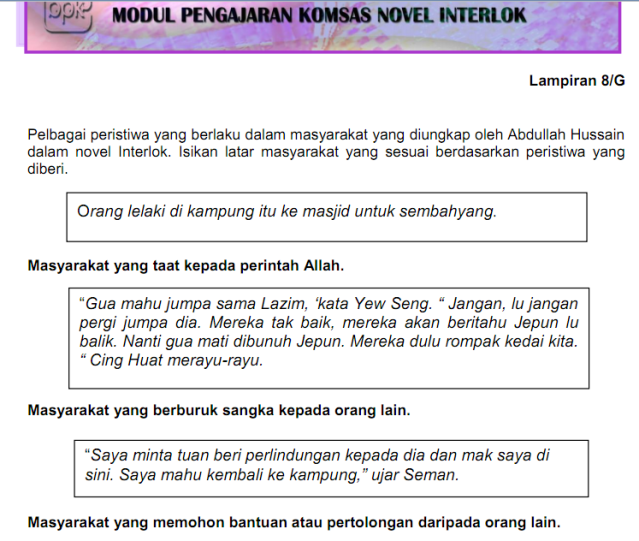
The selected excerpts provide a not-so-subtle narrative that bears striking resemblance to the BTN's doctrine of Malay generosity despite their victimisation at the hands of the Chinese. Coincidence?
I can’t imagine what the students will feel about themselves and each other when such racist narratives are reiterated week after week during Interlok lessons.
Let’s not forget also that in the lesson plan, students are also required to present the excerpts in a storytelling format, complete with “appropriate style and intonation” – which we take to mean that students have to put on their best pakcik, apek or aneh accents when they tell the stories of how helpless the Malays are, how heartless the Chinese are and how heedless the Indians are. We can imagine the kids’ embarrassed laughter at their own exaggerated attempts to sound “authentic” to the “social settings”.
I’m sure the Ministry thinks that’s worth a whole barrel of hoots! Perhaps almost as much fun as the cartoon of Ultraman running away from a killer tsunami that killed thousands of sepets.
But for the rest of us here, it is with utter disbelief that we read that among the focus of the lesson are:
- Menyatakan perasaan secara berterus-terang dan beradab tentang sesuatu perkara untuk mengekalkan hubungan.
- Aras 3(i)Mengemukakan kritikan membina yang mengambil kira sensitiviti orang lain.
- (Enable students) to express their feelings about something frankly and politely in order to maintain relationships.
- Present constructive criticism that takes into account others’ sensitivities.
We find it extremely ironic and laughable that the government states this as a desired result in the classroom, when the Ministry’s lesson plan forces students to reinforce negative racial stereotypes, absorb racial / political indoctrination, and laugh at each other’s fake, stereotypical accents for 80 minutes. And there is no way for students and teachers to escape this humiliation - teachers MUST use the Ministry’s Interlok study materials as exam questions will be taken from there.
Interlok – ALL Parents Need To Protest
See how Interlok is used to insult with its shameless endorsement of derogatory racial stereotypes, for its insidious peddling of dangerous racial doctrines, for its indoctrination of impressionable young minds, and most of all, for its arrogance that parents and students have no say about what values they can be taught.
People really need to realise that Interlok is not an Indian issue, it’s not about whether a book is good enough to be used in schools, it’s not about race sensitivities or factual errors. The racist lesson plans is an affront to ALL peace-loving Malaysians.
And the government’s insistence on making Interlok compulsory in schools makes it a NATIONAL issue affecting every family in Malaysia. If today, a book like Interlok is allowed to be used as compulsory indoctrination in schools, it gives the government permission to repeat the formula in other places and times.
All parents, regardless of race, need to repel this attempt to poison ever younger minds against each other.
Say ‘No’ to the indoctrination of our youth! Because your next generation will reap what is being sown today.
As such, we ALL need to stand up and demand that such insidious indoctrination be thrown out of schools!


